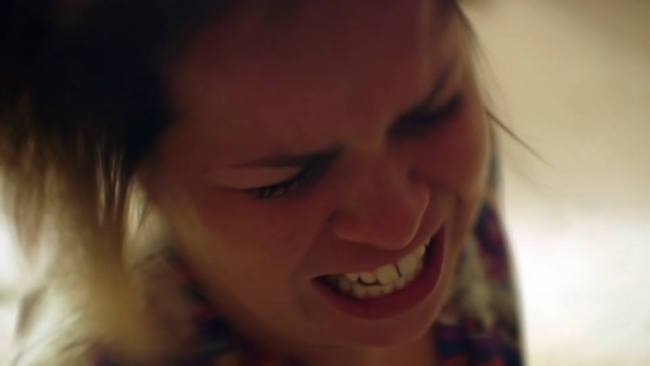Film Review: “Sylvio” and “Tormenting the Hen” at the IFFBoston
The absurdist comedy Sylvio suffers from chronic low energy, but Tormenting the Hen is mysterious and magnetic.
Sylvio – Directed by Albert Birney and Kentucker Audley. At the Brattle Theatre on Friday, April 28 at 9:45 p.m. as part of the Independent Film Festival Boston
Tormenting the Hen – Directed by Theodore Collatos. At the Somerville Theatre on Friday, April 28 at 9:30 p.m. as part of the Independent Film Festival Boston. Post-screening Q&A with Collatos.

A scene featuring the simian hero of “Sylvio.”
By Betsy Sherman
A gorilla suit figures into Albert Birney and Kentucker Audley’s Sylvio, but not as a vehicle for an actor to imitate an ape (I admit I have a fondness for this goofy Hollywood subgenre). It’s because the title character is a gorilla who wears clothing, has a job, drives a car, shoots hoops for recreation and functions fairly normally in human-American suburbia. With a plot that follows its hero on a journey from a soul-crushing cubicle job to a chance at fulfilling his creative dream, this absurdist comedy has brief flashes of transcendence, but on the whole suffers from chronic low energy.
The sunglasses-wearing ape is silent for most of the movie, though he occasionally speaks through a text-to-speech computer program. He lives in a row house where toys are his companions (the movie affects an ‘80s-‘90s feel, with clunky older technology). Sylvio works for a collection agency. He knocks on the door of a debtor who films a TV talk show out of his home studio. When the gorilla is mistaken for a guest juggler and is led in front of the camera, a new world opens up for him. Sylvio’s attempt at juggling causes calamity, but so hilariously that viewers clamor for him to come back and break more stuff. He can quit his job thanks to the new sensation, “What’s the Ape Gonna Break?”
The delight in Sylvio is the minimalist puppet show the ape has been honing from an early age. It’s called “The Quiet Times with Herbert Herpels,” Herbert being a hand puppet of a middle-aged balding man with a mustache, and his quiet time consisting of activities such as ‘making toast.’ Talk-show host Al is happy to give Sylvio a slot on the show for Herbert, but the viewers and new sponsors only want to see the cathartic gorilla-mayhem segments.
The feature-length Sylvio grew out of a series of popular Vine videos. Its sense of humor reflects the Jared Hess (Napoleon Dynamite) school of deadpan. There’s a message here about things such as choosing the creative life, not judging a book by its cover, and finding friends in unexpected places. Sylvio is at its best when it’s most surreal, which is during the Herbert bits and a dream sequence. But otherwise, while it’s trying to skew clichés, it too often ends up repeating them. Both the gorilla mask and the Herbert doll head were molded to have a slight smile. This visual rhyme is what stuck with me.
While Sylvio’s ingredients are offbeat, its sentiments are worn on its sleeve. By contrast, the relationship movie Tormenting the Hen, written and directed by Boston-area native Theodore Collatos, revels in being oblique and ambiguous. Well-acted and seductively shot, it’s mysterious and magnetic.

Carolina Monnerat stars as Monica, an urbanite who comes to the Berkshires with her playwright fiance in search of some rest and relaxation in “Tormenting the Hen.”
The focus is on a couple, Claire (Dameka Hayes) and Monica (Carolina Monnerat), first seen on their way from New York City to the Berkshires, where playwright Claire has been invited to mount a production at a small theater during the summer season. Claire is African-American and Monica is a white Brazilian. Race isn’t relevant initially, but issues of cultural and gender differences gain traction as the story plays out.
As the fiancées settle into a small house—it used to be a chicken coop—there’s a slight threat that the movie will veer into shades-of-mumblecore talkiness. Then a third character comes into the mix, establishing himself as an unshakeable irritant. There follows a tangle of actions and reactions, misunderstandings, liberties taken and buttons pushed, intentionally or otherwise.
The newcomer is a red-bearded young man named Mutty (Matthew Shaw), who emerges from the woods in hiking gear. His family owns the land. Mutty chooses to sleep not in the big house (his mumblings reveal his resentment for his absent parents), but in a tent. Monica encounters him first as the roar from the John Deere mower he’s riding; she thinks he must be the groundskeeper. His cryptic statements in their first conversation include a nickname he gives her, “Little Worm,” that echoes a story she had told Claire about the larvae embedded under her father’s skin whenever he’d come home from the Amazon. Mutty continues to lurk around the grounds—compulsively mowing, among other things—which unnerves Monica.
Claire has plenty of intellectual stimulation, and some frustration, from her work with two actors on her play that explores issues of race and masculinity (one actor is black, one white). The couple’s tenderness becomes barbed with tension. Claire is taken aback when Mutty asks them, “When you gonna get hitched?” Claire isn’t in any hurry, but the increasingly jittery Monica—who is studying environmental engineering, with a special interest in trees—craves the stability of marriage. Monica’s vulnerability is most apparent during a phone conversation with her mother. Significantly, the scene takes place in the woods, where she’s surrounded by all those nicely anchored trees.
And chickens—yes, there are chickens! But they might be ghost chickens, I can’t say for sure. There’s also a plate of chicken hearts—a favorite dish in Brazil—and that’s very real. There’s a cameo from a George “The Animal” Steele action figure.
Tormenting the Hen, with its hints of melodrama and thriller, has a subtle weaving of narrative elements and a kinetic visual style that draws the viewer in. Collatos has a great eye, and makes the most of the gorgeous Berkshire summer while finding in it glints of menace. His camera clings to the actors; it’s as tenacious as that lawnmower din. The talented cast stands up to the scrutiny.
Betsy Sherman has written about movies, old and new, for The Boston Globe, The Boston Phoenix, and The Improper Bostonian, among others. She holds a degree in archives management from Simmons Graduate School of Library and Information Science. When she grows up, she wants to be Barbara Stanwyck.
Tagged: Albert Birney, IFFBoston, Kentucker Audley, Sylvio, Theodore Collatos
